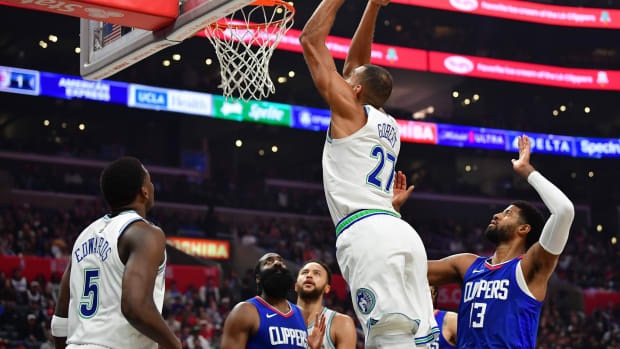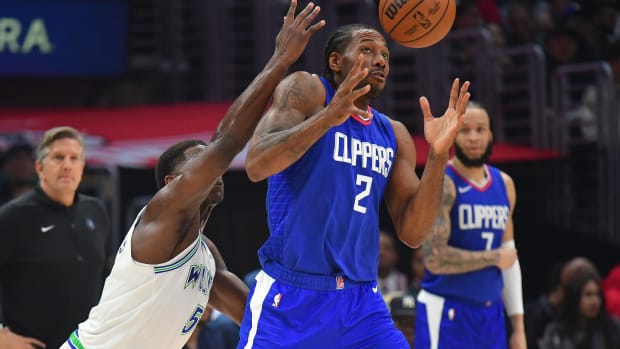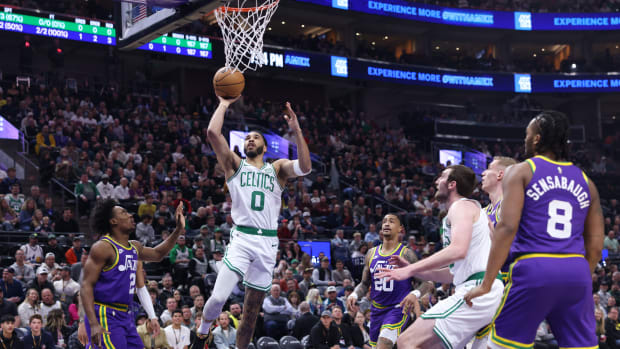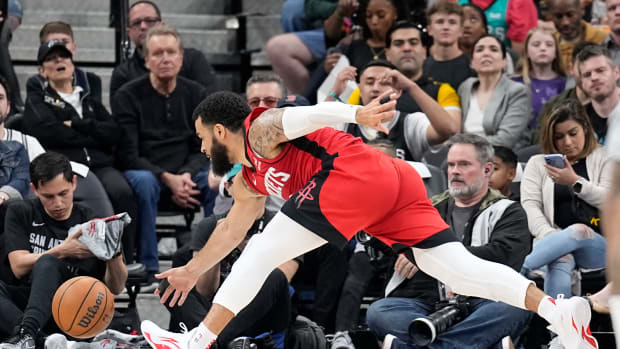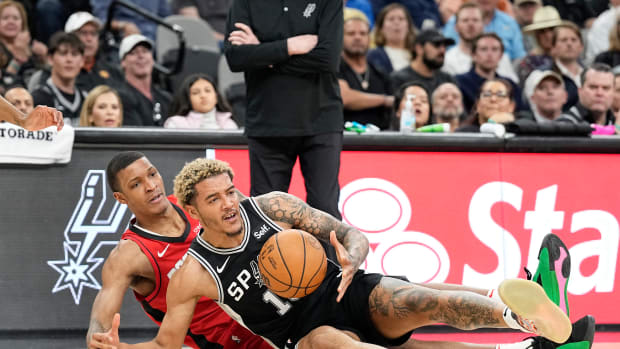Clint Capela cannot forget the excitement of his first triple double. Granted it took place among the couch-cushioned confines of the Hawks center’s old apartment, and his opponents were the computer-controlled Hornets facing the Capela-controlled Thunder in NBA 2K14. But still, Capela, then a teenager coming up in France’s top pro league, found himself giddy when he reached double digits in three major stat categories as a digitized Russell Westbrook. He even hit up a friend to share the big news.
“It’s not like I got them in real life,” Capela says. “It was definitely off my radar, because it was too hard to reach. Almost beyond a dream.”
Fantasy met reality on Jan. 22, in the Hawks’ 116–98 win at Minnesota. Outta my dreams and into my box score. Capela realized he stood a solid chance after the first quarter, peeking at a scoreboard and seeing he had already swatted four shots to go along with six points and eight rebounds. "That’s when I was like, ‘Ooo, maybe I have a chance,’ ” he says.“I know double double is what I do,” he says. “But 10 blocks? I’m not doing this every night.”
The pursuit intensified as the 6' 10" Capela tallied his eighth block just after halftime, and cheers from the Atlanta bench echoed throughout a fanless Target Center. “My teammates were hyping me up,” Capela says. “They were all like, ‘Go get it, boy! Almost there!’ I’m like, ‘Chill out, I don’t want to get too excited and miss it.’ ”
At last, Capela lassoed that elusive third round number, rejecting layups on back-to-back possessions midway through the fourth quarter. “I got subbed out right after,” Capela says. “Everyone was screaming, ‘Hell yeah!’” Final line: 13 points, 19 boards and 10 blocks, the team’s first triple double since Dikembe Mutombo in 2000.
The celebration carried into the locker room, where Capela was doused in water. Calls and texts flooded his phone. His highlights made national news in his native Switzerland. He would take home a game-used Spalding as a souvenir, along with a bottle of pinot noir—from coach Lloyd Pierce—that he doesn’t plan to save. “I’m gonna drink it,” Capela says. “I’ve gotta get other triple doubles.”
I hate to burst your bubble, but triple double trouble
Is comin’ to your town and he’s gonna make rubbleRed Hot Chili Peppers “Magic Johnson,” 1989
Three is a magic number, but the triple double is a Magic number, first appearing in newsprint in 1980 to describe the latest star attraction in L.A., where Showtime-era Lakers fans could scarf down double-double cheeseburgers at a local In-N-Out and watch Magic Johnson gobble up triple-double stats inside the Forum.
The exact origins of this sports verbiage remain a mystery, but credit is generally given to two men, both flacks inspired by Johnson’s all-around statistical might. The first is Harvey Pollack, the 76ers publicist who won a lifetime achievement award from the Basketball Hall of Fame in 2002, the same year Johnson was inducted. “I walked up to Magic and said, ‘You know, without me you wouldn’t even be here today,’” Pollack, who died in 2015, told the Associated Press. “He says, ‘What do you mean?’ I said, ‘Who do you think coined the name triple double and made you famous for doing it?’ ”
The other is Bruce Jolesch, the Lakers’ p.r. director in the early 1980s. “I can’t sit here and tell you that I came up with it out of thin air, but it wasn’t being used when I started using it,” Jolesch says. “I can take credit for bringing it into the current lexicon of NBA jargon, and that’s because of Magic.”
Jolesch first cited the concept on Oct. 12, 1980, on page 4 of his typewritten game notes before the home opener, mistakenly labeling it “a triple-triple” but correcting it by the next game. (He still has a copy, stored in a three-ring binder at his Dallas home. “I probably should send these to the Hall of Fame,” he says.) His usage undoubtedly helped it catch on. In late October 1980, using the sort of geezer phrasing that might accompany a new dance craze, the Los Angeles Times reported that Johnson “did the triple-double seven times last year.”
Since blocks and steals began being tracked in 1973–74, nearly 98% of NBA triple doubles have been reached in points, rebounds and assists. Some will argue that is the only way to attain one. “If you have a triple double that doesn’t include one of those three,” Boston Globe writer Bob Ryan says, “that’s a contrivance that I don’t acknowledge.”
Triple doubles became commonplace in his copy, Ryan says, “because I was covering Larry.” That would be Bird, who once declined coach K.C. Jones’s offer to chase a quadruple double in a February 1985 blowout, instead sitting for the entire fourth quarter with 30 points, 12 rebounds, 10 assists and nine steals. “He basically said, ‘Nah, I’ve done enough damage,’” Ryan says.
Bird’s brag showed that a triple double can be marked by a flex, figurative or literal, as it was in March 2011 when JaVale McGee earned a technical foul for doing a chin-up on the rim after a dunk cinched his first (and only) triple double . . . with his Wizards trailing by 18.
But a triple double can also invoke embarrassment. “That is maybe the worst thing I’ve done in my career,” then Blazers swingman Nicolas Batum said in November 2013, having just completed a triple double on a half-court, buzzer-beating heave while up seven against the Spurs.
In this way triple doubles are versatile, not unlike Dallas guard Luka Dončić, the 22-year-old Slovenian army knife who averages nearly one in every five games (18.2%), the second-highest rate in NBA history behind Westbrook (19.0%). They can spotlight longevity (oldest player: Karl Malone, 40, November 2003); trumpet an arrival (youngest: LaMelo Ball, 19, earlier this season); or simply function as bar trivia. Only triple double ever without 10 points? Bzzt. Draymond Green, February 2017: 12 rebounds, 10 assists, 10 steals and four points.
No matter how they are achieved, though, triple doubles attract the spotlight. A former Vancouver Grizzlies scorekeeper recounted to Deadspin in 2009 how he was once instructed to ensure that Hakeem Olajuwon, then visiting with the Rockets, got a triple double because that would increase the chances of the media-starved Canadian market’s making ESPN. In his career Olajuwon earned 13 others, including one of four NBA quadruple doubles. “It makes you feel accomplished,” he says, “to do something that was very rare.”
Not so much anymore. Five triple doubles on March 13 marked a new single-day high—only to be surpassed by a sextuple of them less than a week later. All told, NBA scorekeepers had logged 129 through Monday, two more than the record set two years ago. Roughly one in every four of those (32) are courtesy of Westbrook, now summoning gaudy stat lines with the Wizards, whose 178 career triple doubles trail only Oscar Robertson’s 181.
“I don’t want to go into a game thinking about getting a triple double,” says Westbrook. “But it definitely gives me insight that I was active, I was moving around, trying to make the right plays. It gives me some shorthand: Something went right today.”
Sabrina Ionescu was perplexed. One moment the Oregon freshman point guard had been enjoying the aftermath of a blowout win over San Jose State in November 2016. The next, coach Kelly Graves had entered the locker room and, like a spy operative passing intel on a park bench, dropped a piece of paper in her lap.
“I was like, ‘Why did he just hand me this stat sheet?’” Ionescu recalls. “I didn’t want to look at it in front of the team, because I was nervous it was something they’d ask me about. Then I looked when I got to the bus and went, ‘Oh, I guess this is why. Because I got a triple double!’”
Growing up in Walnut Creek, Calif., Ionescu had little familiarity with the concept. “I got a bunch in high school and had no idea, because it wasn’t really like my coach was telling me,” she says. “He was just demanding I do more in every single category.” But triple doubles became part of her identity on campus with the Ducks. “I’d be at 12-10-9, and the crowd is just waiting, waiting, waiting,” Ionescu says. “If I didn’t get a rebound, or my teammate got one, everyone would sigh and start yelling, ‘You’ve gotta get one more!’”
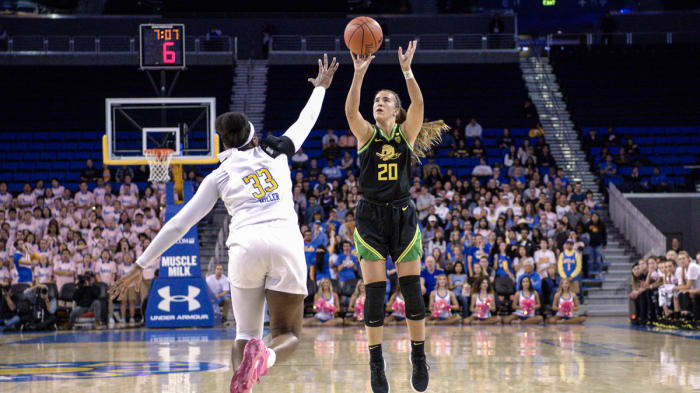
Ionescu had more triple doubles as a Duck than any other college player.
Jordan Naholowa'a Murph/Sports Illustrated
Before the Liberty selected her first in the 2020 WNBA draft, Ionescu put up an eye-popping 26 triple doubles, shattering the NCAA career record of 12, held by point guard Kyle Collinsworth of BYU. Collinsworth, who broke the mark of six (Drexel’s Michael Anderson and LSU’s Shaquille O’Neal) in November 2015, now plays in Japan, where his reputation preceded him. “After the first one I got here,” Collinsworth says, “I was doing an interview in front of a crowd, and they announced me as ‘Kyle, who’s known for getting tons of triple doubles.’”
Triple doubles can do more than form a legacy; they can also honor the legacy of a life lost. Nets guard Bruce Brown’s first triple double came on Dec. 6, 2016, hours after the then Miami freshman learned about the death of his beloved uncle, Edward Dillard. “I couldn’t stop thinking, ‘My uncle had to be there that night,’ “ Brown says now. “I didn’t care much about a triple double until that happened.”
When Westbrook joined Wilt Chamberlain as the only NBA players with a 20-20-20 game, in April 2019, the guard dedicated his performance to a recently slain friend, rapper and fellow South Los Angeles native Nipsey Hussle. “It was a tough couple days for me, just hearing the news, figuring out how to channel my energy towards the game, how to pay tribute to him, to the neighborhood, to our people back in L.A.,” Westbrook says. “And the rest is history.”
The first triple double in NBA history is attributed to Andy Phillip of the 1950 Philadelphia Warriors. Houston Comets legend Sheryl Swoopes led the way for the WNBA, in 1999. “After that, my thought became, ‘Now you have a lot to live up to, because this can’t be the only one that you get,’ “ says Swoopes, who sure enough later recorded what still stands as the W’s only postseason triple double. The only player in either league to debut with one is Robertson (1960), and just three have ended their careers on such a high note: Wilbur Holland of the Bulls (1979), Ben Uzoh (2012) and Dwyane Wade (2019).
While Wade’s statistical swan song with the Heat capped a first-ballot Hall of Fame career, Uzoh’s came as he was playing on an end-of-season contract with the Raptors and living temporarily at Toronto’s Le Germain Hotel. There the 6' 3" guard would jot down his goals on a hotel notepad, separating them into columns labeled thoughts, feelings and actions. Under the final heading Uzoh put triple double, penning into existence the 12-11-12 line he logged in an otherwise meaningless April game against the Nets.
Uzoh, 33, who is training to represent Nigeria in the Olympics, reflects on his last game with pride. After the buzzer Nets All-Star Deron Williams, a former teammate, found him on the court and gushed, “Man, Uz, I don’t even have one of those!” Uzoh’s mother later laminated the sheet of hotel stationery for him. “It’s cool because the culture surrounding it has grown,” he says. “People tag me in stuff all the time because they’ll talk about it on ESPN. That’s very, very rewarding.”
Perhaps this explains why some players are so gung-ho about getting a triple double in the first place. Which brings us to the Ballad of Wrong Way Ricky.
Based outside of Houston, the Ricky Davis Foundation is primarily focused on tackling food insecurity, teaming with celebrities like Rick Ross and 2 Chainz to help feed underserved communities. Its eponymous founder oversees logistics on the ground but also hits the road each summer for a circuit of basketball camps, where the kids tend to know little about his NBA past, but the parents always ask the same thing. “It’s just right off the bat, like, ‘Man, what were you thinking?’” Davis says. “I tell them, ‘I was gonna get that triple double, no matter what.’”
The infamous incident: On March 16, 2003, the 6' 6" Davis caught an inbounds pass near his own basket and, instead of simply running out the clock on a Cavaliers win over the Jazz, laid the ball off his own backboard in an attempt to grab his 10th rebound. He didn’t get credit, but Davis, who had a 12-year NBA career, doesn’t regret his actions. “Wrong Way Ricky, that’s my name now,” he says. “It was a bad, boneheaded play. But if that’s what sticks in their mind, I’d rather something stick than nothing. And everyone associates me with the triple double.” Besides, many other stat hunters can relate.
There was Magic guard Anthony Bowie, who called a timeout with 2.7 seconds left against the Pistons in March 1996, for no reason other than he was one assist shy. After his coach, Brian Hill, handed Bowie a clipboard and stormed off in protest, Bowie designed a play for Joe Wolf to heave a half-court inbounds pass to him; Bowie would then tap the ball to David Vaughn for a layup. Pistons coach Doug Collins ordered his team to stand by and let it happen. “I can see both sides of the coin,” says Wolf. “From [Collins’s] angle, it disrespected the game. But if I put on my player’s hat, I look at AB and say, ‘This was once-in-a-lifetime right here.’”
Hawks guard Bob Sura had already notched back-to-back triple doubles in April 2004 when, like Davis, he intentionally blew a layup at the buzzer. (“I actually did it at the right basket,” he says.) Alas, commissioner David Stern rescinded Sura’s 10th rebound because he hadn’t attempted a legitimate shot. “I don’t think it would’ve done any harm to leave it,” Sura laments. “I should’ve just said that the ball slipped out of my hand.”
Countless other triple doubles have slipped away. Johnson, third on the all-time list with 138, finished 46 games with 10-plus points, 10-plus assists and nine boards; LeBron James, the only player besides Westbrook with triple doubles against all 30 teams, has 13 times suffered the agony of 10-plus points, nine rebounds and nine assists. In February 2017, three years before he finally got one, Blazers guard Damian Lillard was sitting on 34-11-9 against the Pistons with about four minutes left, when he found an open Jusuf Nurkić under the rim and watched the big man blow a layup. “I was like, maybe it’s just not meant to be tonight,” Lillard says.
Triple doubles may be an individual stat, but it takes a group effort, as when Kentucky’s Derek Willis purposely—and perfectly—bricked a free throw against Ole Miss in 2016 so teammate Isaiah Briscoe could grab the rebound and wrap up the third triple double in school history. Other times the help comes from the sidelines: The game after his gaffe, Sura and the Hawks visited Boston, where a pair of scorekeepers came up to him during warmups and told him, “Just to let you know, we would’ve had that triple double for you long before the fourth quarter.”
Move the rock like Russell Westbrook,
Triple double the whole season, woah.Lil Wayne (feat. Lil Twist) “Ball Hard,” 2020
The torch was passed alongside a statue and some words of wisdom. In April 2017 Robertson traveled to Oklahoma City to present Westbrook with the Dr. James Naismith Achievement Sculpture for having just broken his single-season triple doubles record of 41. The pair also talked for about an hour before the game. “I told him he was great,” Robertson says, “and that ‘it’s a big load off another player’s shoulder when they can rely on you to do all these things. But then they expect you to do it all the time.’”
In his 14 pro seasons Robertson’s 181 triple doubles accounted for 32.3% of the NBA total—and he received recognition for none of them. “I didn’t hear of triple doubles until I was out of the game,” he says. When the Big O watches the league today, however, he sees triple-double machines galore. Like LeBron: “When things are right, he’s gonna get a triple double every single night.” And Giannis Antetokounmpo: “A freak of nature. I’m shocked he doesn’t lead the league in triple doubles.” But none are more efficient than Westbrook, who in 2016–17 joined Robertson as the only players to average one over a full season and then repeated the feat in
’17–18 and ’18–19: “He’s a triple double king himself,” says Robertson.
Many factors helped kindle the current explosion. Robertson points out assist criteria was stingier in his day: “The pass had to lead to a layup. Maybe one dribble.” Others cite evolutions in the modern game. “Less isolation, more ball movement, more shooting early in the shot clock, which leads to more assists,” says Pistons center Mason Plumlee, whose two triple doubles (both this season) give him more than Julius Erving (one) and Moses Malone (none) combined. “Or the bigs just do the dirty work and the guards steal all the rebounds.” Lillard has another theory: “I think [players] are seeking them out more, tracking what they have over the course of the game.”
And what does it mean, exactly, to get a triple double? In one sense, nothing whatsoever. A triple double doesn’t provide any real insight into an NBA player’s performance, even if nearly 75% of them have come in winning efforts. Its benchmarks are arbitrary, no more useful than another catchily named cluster of random totals. (Sample club: the Triple Bumble, featuring just three players—Ted McClain, Allen Iverson, Dennis Smith Jr.— with nine-plus turnovers, six fouls and less than 30% shooting from the field.) “Look, it’s goofy,” Plumlee says. “What’s the difference between nine and 10? You probably did a good job if you got nine.”
Triple doubles aggregate, but they also aggravate. Earlier this year, when asked by a Reddit user whether there were any stats he found “overutilized,” ESPN NBA analyst Kirk Goldsberry typed, “TRIPLE DOUBLES. They should be banned from the lexicon.” Indeed the term can be an overused crutch for broadcast crews and beat writers looking to summarize a player’s big night. Still, Goldsberry concedes that at least the triple double “teaches people about the basic stats of the game, so I’m not against it in that regard.” And other cynics see value as well.
“I never thought about it when it was happening; I didn’t think that much about it when people started making such a big deal about it and I don’t think much about it now,” Robertson says. “But if fans want to honor players for getting triple doubles, then I think that’s wonderful.”
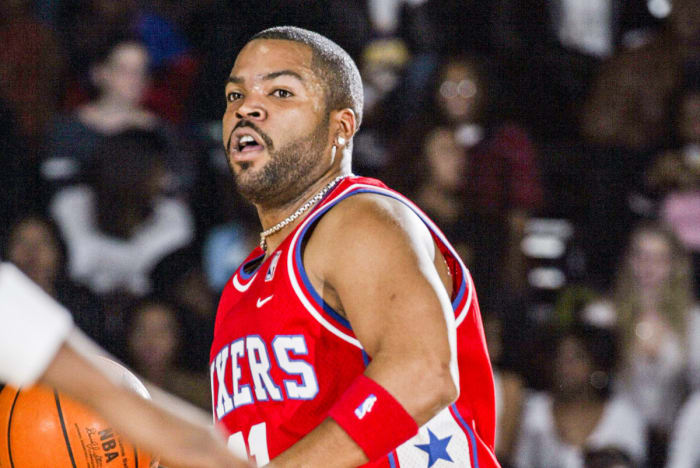
According to Ice Cube, real ballers keep track of stats in their head.
Gregory Shamus/NBAE/Getty Images
Called up the homies and I’m askin’ y’all,
“Which park, are y’all playin’ basketball?”
Get me on the court and I’m trouble.
Last week f----- around and got a triple double.Ice Cube “It Was a Good Day,” 1992
O’Shea Jackson was raised in South Central L.A., right on the Inglewood border, at a house with a backyard court that he and his older brother dubbed the Forum. He was a Lakers diehard, listening and learning as play-by-play man Chick Hearn educated viewers on Magic’s all-around prowess. “So this is where I started to become . . . I wouldn’t say obsessed, that’s the wrong word,” says the rapper known as Ice Cube. “But this is where triple doubles got on my radar and became part of my everyday sports talk.”
Make of the stat what you will, but its cultural impact is undeniable. There is a Triple Double IPA brewed in Portland; a Triple Double Crunchwrap sold at Taco Bell; and a racehorse named Triple Double, who won seven of 29 starts from 2010 to ’16. Two years ago, In-N-Out settled an infringement lawsuit with Smashburger concerning the latter’s Triple Double—hot beef over hot beef, if you will. Triple Double Oreos have been discontinued but endure in spirit thanks to Triple Double Management Inc., registered in California to Earleatha (Cookie) Johnson, Magic’s wife.
“It’s the holy grail of basketball stats,” says Kyle Hewlett Jr., co-owner of Triple Double Juice in East Orange, N.J., where employees wear zebra-striped referee shirts, fruit smoothies are served in Spud (16 oz.) and Shaq (20 oz.) sizes, and a mini-museum of hoops memorabilia sits behind the register, featuring a glass-encased basketball autographed by Robertson as “Mr. Triple Double.”
Aside from Magic, it’s possible that no individual has influenced the spread of the term more than the now 51-year-old Ice Cube, who rhymed trouble with double on the seventh track of his 1992 album, The Predator, and never looked back. “I think we both did what we could to popularize the phrase,” he says. “More people probably talk to me about that line than probably any other I’ve had, besides ‘F--- the police’ and ‘Straight outta Compton, crazy motherf----- named Ice Cube.’ People say, ‘Man, come on, stop lying, Cube, who was taking stats during a pickup game?’ If you a real baller, you take stats in your head.”
Given his love for the game—long before he founded the BIG3 league, his crew would kill time between recording sessions at Glendale’s Echo Sound by playing pickup on a hoop behind the studio—Ice Cube is a fitting ambassador for one of its most famous terms. He loves its numerical simplicity. “If you scored 98 points, it’s cool,” he says. “But you score 100? Goddamn, that milestone, that round number.” And he loves its lyrical poetry. “It’s an oxymoron in a way. Kind of like jumbo shrimp. Triple double. . . . It’s cool to even say.”
More than anything, though, he loves what the triple double symbolizes—why he and so many other musical artists have tapped its power in their lyrics. “It’s definitely a phrase of excellence and dominance,” he says.
Or, at the very least, the sign of a really good day.
More NBA Coverage:
• Mannix: Sorry LeBron, the Play-in Is Here to Stay
• Power Rankings: Time to Worry About the Lakers?
• What's Next for the Knicks?
• P.J. Tucker on Getting Traded, Guarding Harden


































